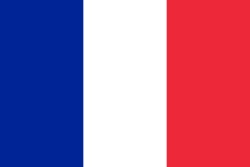|
|
| |
|
|
| |
|
|
|
|
| |
 |
| The flag of France. |
French
French (French: français, pronounced "Fronce-eh") is a
Romance language that was first spoken in France. It is
also spoken in Belgium (Wallonia), Luxembourg, Quebec
(Canada), Switzerland (Romandy) and many different
countries in Africa (Francophone Africa). About 220
million people speak French as a native or a second
language. It has also been one of the roots of other
languages such as the Haitian Creole language. Like the
other Romance languages, its nouns have genders that are
divided into masculine (masculin) and feminine (féminin)
words. |
|
History
In ancient times, the Celts lived in what is now France.
In those days, the land was called Gaul (Latin: Gallia).
The Romans conquered Gallia and divided it into
provinces. Because the Romans spoke Latin, the local
people learned Latin and began to speak it. Their own
language, Gaulish, tended to be spoken less often,
although Breton is a language still spoken today in the
part of France called Brittany, that came from the old
Celtic language.
French pronunciation, more so than other Romance
languages, became radically different from Latin. After
the Roman Empire fell and Germanic peoples swarmed the
countryside, Vulgar Latin was changing quickly. In
medieval France it changed into two dialects or
languages: langue d'oc and langue d'oïl. They both mean
"language of yes", because oc was the word for "yes" in
the south, and oïl meant "yes" in the north. Today, the
word for yes in French is oui, pronounced like "we".
In 1635, France established the French Academy in order
to standardize the French language. To this day, the
academy establishes the rules for Standard French.
Langue d'oc is now called Occitan, and it is still
spoken by many people in Southern France. |
|
Letters
French uses the roman alphabet, like English. There are
a few differences, because vowels can have three types
of diacritics added on to them. These are the acute
accent é; grave accent è and circumflex accent î. A
cedilla can also be added onto a c to make ç. |
|
|
Many French words are like English words, because
English took many words from the Norman language, a
dialect of French influenced by Old Norse. This is
despite the fact that scholars consider English to be a
Germanic language like German. Words in different
languages with the same meaning which are spelled
similarly are called cognates. Most English words ending
with "tion" and "sion" came from the French language. |
|
|
 Kiddle: French Kiddle: French
Wikipedia: French |
|
|
|
|
|
|
|
|
|
|
|
|
|
|
|
|
Search Fun Easy English |
|
|
|
|
|
|
|
|
|
|
|
|
|
|
|
About
Contact
Copyright
Resources
Site Map |